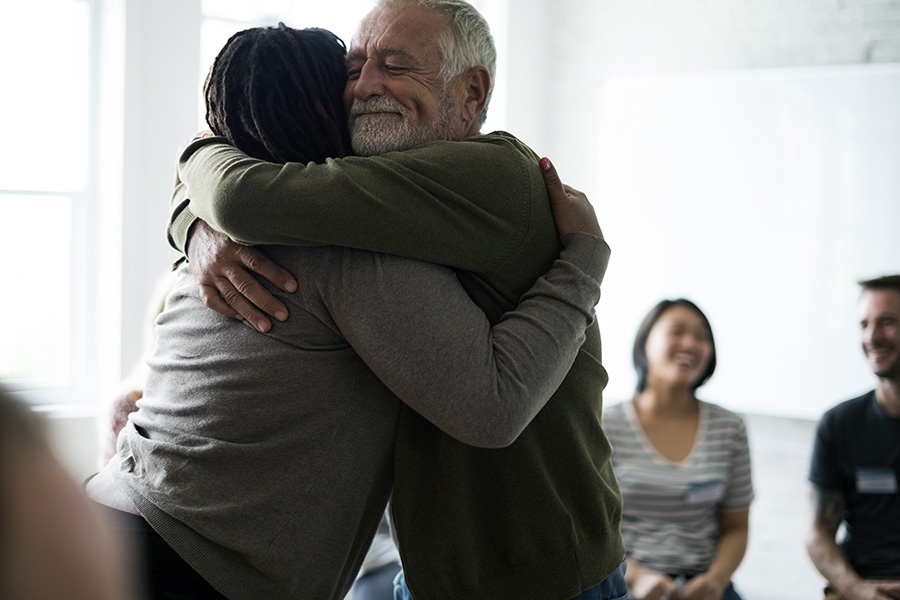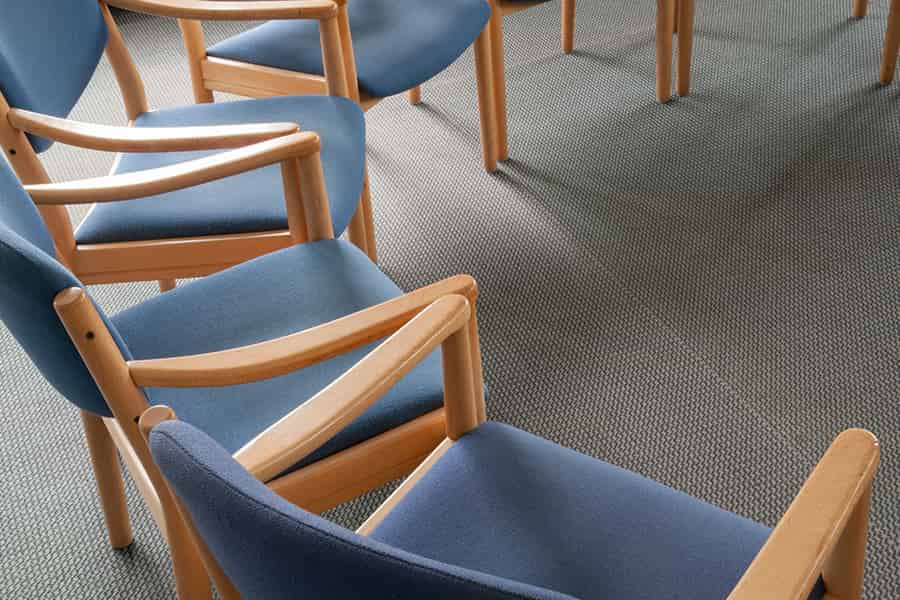Dream Journal
 Note From Dr B.
Note From Dr B.
People aren’t expected to recover from a life-threatening illness without care and we use the dimension of professional guidance to represent how we help an individual do the things that are necessary to recover. That professional guidance during the first phase might be helping them to get up in the morning to re-establish their circadian rhythms. Later on, it’s an individual therapy where they can delve deeply into emotional hurts that they’ve experienced about their life and share them with another person, sometimes for the first time in their lives, or it could be in having someone just direct you to a particular app that’s going to allow you to celebrate the days that you have in recovery.
Professional guidance is extremely important because individuals who can get sober in AA alone did. They’re not in treatment, and those are individuals who need some professional assistance to help decide what elements to put together and what specific way they need to approach treatment in order to recover. Our staff is passionate, caring, and dedicated to helping others achieve the best outcomes possible.
Sincerely,
Dr. B
Theme Analysis as it Relates to the 12 Step Program
Professional guidance can help individuals through every single one of the 12 steps if necessary. Professionals can use psychotherapeutic techniques to help their clients through the acceptance stage of admitting powerlessness over addiction. They can teach about hope and a Higher Power and guide them through the process of taking moral inventory. They can provide them with self-reflection techniques and give advice on the appropriate ways to make amends.
Of course, recovery is primarily a self-driven process and progression must come from self-examination and a willingness to grow, but professional support is certainly not harmful as an additional boost of strength.
News Highlights
Rural Doctors Face Major Barriers Treating Opioid Use Disorder
Researchers surveyed over 1000 rural physicians qualified to prescribe buprenorphine and found that only 60% were actually using their qualifications to prescribe the medication and accept new patients. The reasons they gave include potential misuse of the buprenorphine, lack of mental health support in the area, and time constraints. In light of the opioid crisis and the already numerous barriers standing in the way of recovery in rural areas, these statistics are alarming.
To learn more, click here: Rural Doctors Face Major Barriers Treating Opioid Use Disorder
Featured Staff Member Questions: Rosemary Mulcahey
Q. What is your current position and job description?
A: As a case manager for Two Dreams Outer Banks, my role varies daily. I aid clients in daily life needs and assist throughout the treatment process.
Q. Where did you work before Two Dreams and what did you do?
A: Prior to working for Two Dreams Outer Banks I spent several years working in the mental health field with juveniles in a residential treatment facility. Not unlike Two Dreams, I assisted the clients in moving through a structured day and assisted with any admissions, appointments required, or variations in routine that would arise.
Q. What has your journey been like at Two Dreams?
A: Two Dreams has been a very welcoming environment that has allowed for learning and personal growth from the very beginning.
Q. What made you get into this profession?
A: I have found that helping others has always come naturally and it is extremely rewarding to witness individuals succeed and advance in life.
Q. What is the most gratifying part of your job?
A: I find it gratifying to witness the progression of an individual from admission to discharge. It is amazing to be present and involved in an individual’s evolving and healing.
Q. What do you like about the Two Dreams program?
A: I appreciate the structure and schedule at Two Dreams Outer Banks. I also appreciate the collaborative efforts of the staff as it pertains to the individual care of the clients.
Q. Where did you go to college and post-grad and what did you study?
A: I attended California University of Pennsylvania where I obtained a Bachelor of Science in Criminal Justice.
Q. How would others describe you? How does your personality complement the work that you do?
A: I am hopeful that my peers would consider me to be reliable and dedicated to my profession. I believe that an empathetic nature and patience are essential to assisting clients in the healing process.
Q. What do you like to do when you’re not at work? What are your hobbies?
A: When not at work, I am typically enjoying time with my family and pets, traveling, running, or up-cycling furniture.
3 Ps: Physical Well-Being, Personal Productivity, and Mental Peace
The need for connection is a built-in piece of the human condition, particularly when one is in “the trenches,” so to speak. Peer support is crucial for the client during their “Coming In” Phase at Two Dreams. Here, the individual gets to see themselves, maybe for the first time, in the mirror of others. It can take the idea of shame and isolation to a level of shared emotions that were otherwise thought of as “just me”. They have a shared concept that they are not alone. Peer support allows the Client to also reach out and help others; this teaches them that they’re helpful to a community of healing. This assists the individual to get out of their own head and prove that they are, indeed, valuable and helpful to the world around them.
In the “Looking In” Phase the client begins to go underneath the layers of their addiction to explore buried wounds in hopes of not just managing a dependence, but understanding the challenges that led to this culmination called addiction. It can lead to a new relationship with the self that is more compassionate, more understanding, and more enlightened so that the individual isn’t operating in the dark. They have a better chance at dealing with their issues consciously with healthier tools. Pain that was once scary and engulfing can become less aggressive. The client has the opportunity to gain a new perspective, thus causing a psychological shift.
Taking these new growth experiences and incorporating them into the individual’s life is paramount. Having the experience of being taught by a professional staff member and peer support group will help them find the tools that have been missing. They are essential elements that, hopefully, will remain in the forefront of the client’s new way of thinking and handling life’s challenges. These tools offer a new way to “Look Out” at the world ahead of them.
Outer Banks Community Update
Two Dreams Outer Banks believes that appropriately utilizing professional guidance is so important, that it is included as one of the seven core components of treatment. The seven components of treatment include abstinence, peer support, professional guidance, nutrition, exercise, rituals and medication.
At Two Dreams Outer Banks, clients are given the opportunity each day to effectively and appropriately utilize professional guidance. The clients are provided with the necessary support, safety, knowledge and tools to achieve a healthy, substance-free lifestyle via professional guidance during their stay. Two Dreams’ professional staff lead by example and can personally relate to the clients, by knowing firsthand how to battle addiction. Those staff members serve as evidence that through utilizing professional guidance they can make a difference. They reassure clients that the seven components they are focusing on are in fact obtainable.
With all the hard work each client puts forth in their treatment and newfound life in recovery, it is important to incorporate a sense of balance in making fun new memories as well. This is done in many ways at Two Dreams Outer Banks through their weekly recreational activities. Recently, these activities have included mini golf, ice cream, beach time and kayaking. In the upcoming week, we are looking forward to attending the new waterpark, H2OBX!
Chicago Update
Linden Oaks Behavioral Health in Naperville, Illinois near Chicago is taking steps to fight the opioid crisis by opening a new medication-assisted therapy clinic. Just like our Two Dreams Chicago medication-assistance program, patients receive a prescription for Suboxone and behavioral health care as well. The hospital system is also making a plan to redesign pain clinics and establish clearer prescription guidelines for professionals. Good job, Linden Oaks!
Click here to read more: http://www.chicagotribune.com/suburbs/naperville-sun/news/ct-nvs-linden-oaks-opioid-clinic-st-0712-20170711-story.html
NOLA Update
Louisiana’s health secretary, Rebekah Gee, is calling for federal intervention in the fight against high drug prices. For example, hepatitis C, a virus often contracted by injection-drug users, has many treatment options available, but the price can be up to almost $100,000 for a 12 week course of treatment and Medicaid patients have to prove they have severe liver damage before gaining access to the medication. Gee is hoping the federal government will step in to lower drug prices, perhaps by overriding medication patent protections, in order to help the community at large.
For more information, click here: https://www.washingtonpost.com/business/economy/louisiana-considers-radical-step-to-counter-high-drug-prices-federal-intervention/2017/07/03/456b99f6-4a59-11e7-a186-60c031eab644_story.html
Thank you to our content contributors
For admissions and all staff call us at: (504) 510-2331
© 2017 Two Dreams. All Rights Reserved.

 Note From Dr B.
Note From Dr B.


